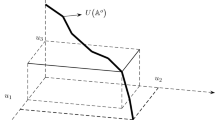Abstract
This paper contributes to a theory of rational choice for decision-makers with incomplete preferences due to partial ignorance, whose beliefs are representable as sets of acceptable priors. We focus on the limiting case of `Complete Ignorance' which can be viewed as reduced form of the general case of partial ignorance. Rationality is conceptualized in terms of a `Principle of Preference-Basedness', according to which rational choice should be isomorphic to asserted preference. The main result characterizes axiomatically a new choice-rule called `Simultaneous Expected Utility Maximization'. It can be interpreted as agreement in a bargaining game (Kalai-Smorodinsky solution) whose players correspond to the (extremal) `acceptable priors' among which the decision maker has suspended judgment. An essential but non-standard feature of Simultaneous Expected Utility choices is their dependence on the entire choice set. This is justified by the conception of optimality as compromise rather than as superiority in pairwise comparisons.
Similar content being viewed by others
REFERENCES
Anscombe, F.J. and Aumann, R.J. (1963), A definition of subjective probability, Annals of Mathematical Statistics 34: 199–205.
Arrow, K.J., Barankin, E.W. and Blackwell, D. (1953), Admissible points of convex sets, in: H.W. Kuhn and A.W. Tucker (eds.), Contributions to the Theory of Games, pp. 87–91. Princeton University Press.
Arrow, K.J. (1960), Decision theory and the choice of a level of significance for the t-test, in: I. Olkin et al. (eds.), Contributions to Probability and Statistics: Essays in the Honor of Harold Hotelling, pp. 70–78. Stanford: Stanford University Press.
Arrow, K.J. and Hurwicz. L. (1972), An optimality criterion for decision-making under ignorance, in D.F. Carter and F. Ford (eds.), Uncertainty and Expectations in Economics. Oxford.
Barbera, S. and Jackson, M. (1988), Maximin, leximin and the protective criterion: characterizations and comparisons, Journal of Economic Theory 46: 34–44.
Barnard, G.A. (1949), Statistical inference, Journal of the Royal Statistical Society B 11: 115–149.
Berger, J.O. (1985), Statistical Decision Theory and Bayesian Analysis, Second edition. New York: Springer.
Bewley, T.F. (1986), Knightian Decision Theory, Part I, Cowles Foundation Discussion Paper No. 807.
Birnbaum, A. (1962), On the foundations of statistical inference, Journal of the American Statistical Association 57: 269–306.
Carnap, R. (1952), The Continuum of Inductive Methods. Chicago: University of Chicago Press.
Cohen, M. and Jaffray, J.-Y. (1980), Rational behavior under complete ignorance, Econometrica 48: 1281–1299.
Cohen, M. and Jaffray, J.-Y. (1983), Approximations of rational criteria under complete ignorance and the independence axiom, Theory and Decision 15: 121–150.
Cohen, M. and Jaffray, J.-Y. (1985), Decision making in a case of mixed uncertainty: A normative model, Journal of Mathematical Psychology 29: 428–442.
Dekel, E., Lipman, B. and Rustichini, A. (1998), Standard state space models preclude unawereness, Econometrica 66: 159–173.
Elster, J. (1989), Solomonic Judgments. Studies in the Limitations of Rationality. Cambridge University Press.
de Finetti, B. (1937), La prévision: ses lois logiques, ses sources subjectives, Annales de l'Institute Henri Poincaré 7: 1–68.
Hendon, E., Jacobsen, H.J., Sloth, B. and Tranoes, T. (1994), Expected utility with lower probabilities, Journal of Risk and Uncertainty 8: 197–216.
Imai, H. (1983), Individual monotonicity and lexicographic maximin solution, Econometrica 51: 389–401.
Jaffray, J.-Y. (1989), Linear utility theory for belief functions, Operations Research Letters 9: 107–112.
Kalai, E. and Smorodinsky, M. (1975), Other solutions to Nash's bargaining problem, Econometrica 43: 513–518.
Keynes, J.M. (1921), A Treatise on Probability. Vol. 8 of Collected Writings (1973 ed.). London: Macmillan.
Levi, I. (1980), The Enterprise of Knowledge. Cambridge, MA: MIT Press.
Luce, R.D. and Raiffa, H. (1957), Games and Decisions. New York: John Wiley.
Maskin, E. (1979), Decision-making under ignorance with implications for social choice, Theory and Decision 11: 319–337.
Milnor, J. (1954), Games against Nature, in: Thrall, Coombs and Davis (eds.), Decision Processes, pp. 49–59. New York: John Wiley.
Modica, S. and Rustichini, A. (1994), Awareness and partitional information structures, Theory and Decision 37: 104–124.
Nehring, K. (1991), A Theory of Rational Decision with Vague Beliefs. Ph.D. dissertation, Harvard University.
Nehring, K. (1992), Foundations for the theory of rational choice with vague priors, in: J. Geweke (ed.), Decision Making under Risk and Uncertainty. Dordrecht: Kluwer.
Nehring, K. (1995), A theory of rational decision with incomplete information. University of California, Davis, Working Paper #95-13.
Nehring, K. (1999), Capacities and probabilistic beliefs: A precarious coexistence, Mathematical Social Sciences 38: 197–213.
Radner, R. and Marschak, J. (1954), Note on some proposed decision criteria, in: Thrall, Coombs and Davis (eds.), Decision Processes, pp. 61–68. New York: John Wiley.
Savage, L.J. (1951), The theory of statistical decision, Journal of the American Statistical Association 46: 55–67.
Savage, L.J. (1954), The Foundations of Statistics. New York: Wiley. Second edition 1972, Dover.
Smith, C.A.B. (1961), Consistency in statistical inference and decision, Journal of the Royal Statistical Society, Series B, 22: 1–25.
Walley, P. (1991), Statistical Reasoning with Imprecise Probabilities. London: Chapman and Hall.
Walley, P. (1996), Inferences from multinomial data: Learning about a bag of marbles (with discussion), Journal of the Royal Statistical Society, Series B, 58: 3–57.
Author information
Authors and Affiliations
Rights and permissions
About this article
Cite this article
Nehring, K. A Theory of Rational Choice under Ignorance. Theory and Decision 48, 205–240 (2000). https://doi.org/10.1023/A:1005298715864
Issue Date:
DOI: https://doi.org/10.1023/A:1005298715864




